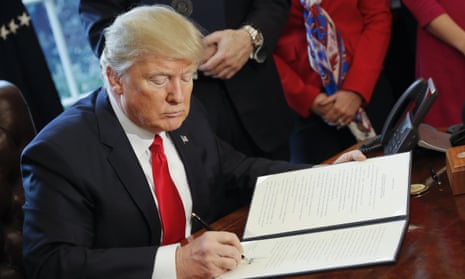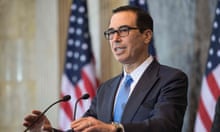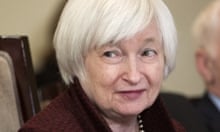Donald Trump moved to roll back the financial regulations brought in after the last financial crisis on Friday, directing a review of the Dodd-Frank Act, which was enacted to ensure there would never be another 2008-style meltdown.
The US president said his latest executive order was necessary because the regulations were too onerous on business and hurting the economy. But the move was largely symbolic – only Congress can rewrite the legislation.
A second directive is expected to halt the implementation of an Obama-era rule that would have required brokers to act in a client’s best interest when providing retirement advice, rather than seek the highest profits for themselves.
“We desperately need to overhaul how we approach financial regulation,” said the White House press secretary, Sean Spicer. He said Dodd-Frank was a “disastrous policy” that was “crippling” the US economy.
The treasury secretary has 120 days to consult with the Financial Stability Oversight Council, established by the Dodd-Frank Act to look out for excessive risks to the US financial system, and report back on whether it was meeting Trump’s “core principles” for financial regulation. These include preventing taxpayer-funded bailouts; fostering economic growth; enabling US companies to be competitive with foreign firms in domestic and foreign markets; and advancing American interests in international financial regulatory negotiations and meetings.
Opponents of reform immediately accused Trump of caving in to Wall Street after a campaign pledge to hold banks accountable.
“Donald Trump talked a big game about Wall Street during his campaign – but as president, we’re finding out whose side he’s really on,” said Senator Elizabeth Warren, one of Trump’s fiercest critics.
“The Wall Street bankers and lobbyists whose greed and recklessness nearly destroyed this country may be toasting each other with champagne, but the American people have not forgotten the 2008 financial crisis – and they will not forget what happened today.”
Before signing the order, Trump met with his business advisory panel, which includes 18 executives from large US companies including GE, Citigroup, General Motors, Tesla and Disney.
“We expect to be cutting a lot out of Dodd-Frank, because frankly I have so many people, friends of mine, that have nice businesses and they can’t borrow money … They just can’t get any money because the banks just won’t let them borrow because of the rules and regulations in Dodd-Frank. So we’ll be talking about that in terms of the banking industry,” Trump said.
The president was backed by Gary Cohn, director of the national economic council and a former Goldman Sachs banker. “Americans are going to have better choices and Americans are going to have better products because we’re not going to burden the banks with literally hundreds of billions of dollars of regulatory costs every year,” Cohn said in an interview with the Wall Street Journal.
Cohn, formerly the chief operating officer at Goldman, said the executive order was “a table-setter for a bunch of stuff that is coming”.
On the campaign trail, Trump accused Hillary Clinton and his Republican rival Ted Cruz of being “in bed” with Goldman Sachs. He also said hedge funds were “getting away with murder”.
The Dodd-Frank Act was a sweeping, bipartisan plan to overhaul the financial regulatory system after the worst crisis since the Great Depression.
The 2010 reform bill aimed to prevent the failure of a big bank from triggering a meltdown in the financial system as the collapse of Lehman Brothers in 2008 did, setting off a wave of corporate crises that led to a global recession. The aim was to more closely monitor big institutions that are “too big to fail”, and to limit the types of risks they can take.
Trump had promised to dismantle Dodd-Frank, claiming it was holding back lending and tying up business in red tape. Among the most vulnerable areas of the act is the so-called Volcker rule, first proposed by Paul Volcker, the former Federal Reserve chairman.
The rule seeks to put a firewall between a bank’s consumer operations and its risky trading activities, and to ensure that the bank is not making bets against the interests of its customers, as many did by betting on a housing collapse while selling mortgage-backed bonds. Cohn is a critic of the Volcker rule, as is Trump’s treasury secretary nominee, Steven Mnuchin, another former Goldman partner.
Another target will be the Consumer Financial Protection Bureau, a Dodd-Frank creation originally proposed by Senator Warren. The CFPB has proved an effective consumer watchdog and has returned over $11bn to the victims of payday lenders, loan sharks and those charged excessive overdraft fees since its creation.
But the dismantling of Dodd-Frank will be met with strong opposition from Democrats, consumers and activist groups. Lisa Donner, executive director of lobby group Americans for Financial Reform, said: “What they are trying to do is make it easier for big banks to steal from people.”
Donner said the move was “a stunning betrayal of what Trump promised on his campaign trail, and that was to protect us by standing up to Wall Street. That is what the people who voted for him supported.”
But Donner said dismantling Dodd Frank would not be easy. “This is a law that was passed by Congress and needs to be changed by Congress. It can’t be done by fiat.”




